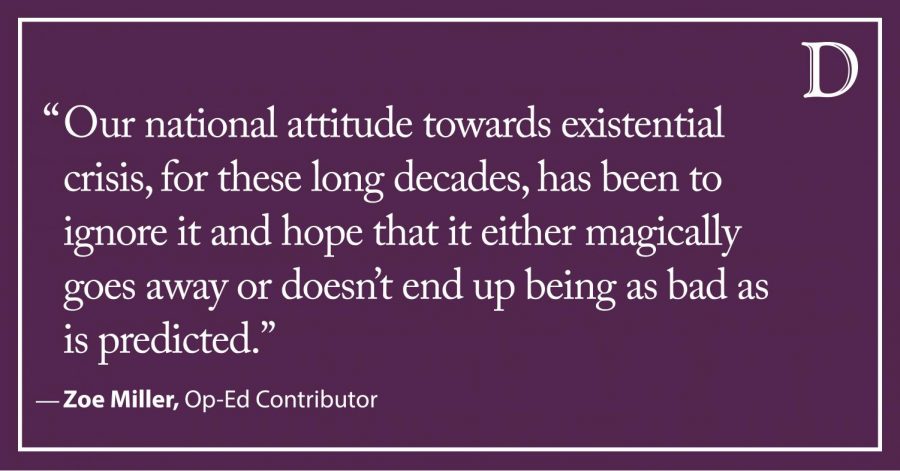Miller: The COVID-19 response is what the climate response should have been, but at a grave cost
April 13, 2020
For years now, I’ve been asking myself what kind of changes would have to be implemented in order to create a carbon-neutral society.
I am not an environmental scientist or an economist, but I know enough to understand that our current society is a sprawling, complex carbon-making machine. In order to save ourselves, most of that complex machine that we live within would have to be shut down.
Most businesses would have to be massively disrupted and the way people live their daily lives would have to be changed. We’d have to stop flying. We’d have to shut down businesses that make plastic and paper waste or large amounts of greenhouse gases. Things would have to be torn down, almost to the foundations, and then rebuilt. This required rebuilding would be messy and painful. It would put people out of work; it would be its own catastrophe, an economic catastrophe, even though it’s designed to try and avoid global cataclysm.
I always thought those kinds of changes could never happen. It would be too disruptive to people’s lives and would wreck the economy too badly. Activism could never make it happen. Our current federal government would never take this type of aggressive action; we all know that’s not their style. Even a Democrat-led government probably wouldn’t take those steps because it smacks too much of authoritarianism and would be too widely unpopular.
And then March came. Suddenly changes on the scale I was imagining came to pass almost overnight — but not because of climate-related reasons.
After so many years of inaction and stagnation on the chronic climate crisis, the acute, fast-moving COVID-19 crisis created the type of wide-spread changes to business and daily life that I thought could not be achieved.
The changes were not the exact ones needed for carbon neutrality, but they were just as massive, just as catastrophically disruptive. I was shocked. I am still shocked.
Our national attitude towards existential crisis, for these long decades, has been to ignore it and hope that it either magically goes away or doesn’t end up being as bad as is predicted. I honestly didn’t expect anything to be done to mitigate the coronavirus spread because I’ve never seen mass action taken to deal with the other crisis that we all live with.
I’d assumed we as a nation would just accept the death toll from coronavirus and the survivors would all move on with our lives. If the threat of everyone and everything on earth dying was not enough to disrupt the usual order of things, what chance did a smaller threat like the coronavirus have to stop the rolling juggernaut of American industry?
But I badly misjudged how the U.S. would react to this new threat. We have all stopped dead in our tracks.
Initially, our federal government tried to treat the COVID-19 crisis the way they treated the climate crisis. They denied it existed; they ignored how dangerous it was.
But they couldn’t treat COVID-19 the same way as the climate for long. It moved too fast; it hit too hard. The “deny, deny, deny” playbook doesn’t work as well on you when you’re sick and when people all around you are getting sick. The strategy that had worked for so long on the longer, slower climate crisis fell to pieces rapidly when applied to the rapidly moving COVID-19 crisis.
Now we can all see, clear as day, both that wide-scale change can be achieved and how awful a cost it comes at. The economy is dropping out around and under us. We are all paying dearly for the choice to take sufficient action to control this crisis.
At least, though, the question of whether mass change is possible or not is answered. Now, we must figure out how to mitigate the economic consequences of this type of change so that ordinary people are not crushed underneath the wheel of progress.
This will not be the last time we are asked to change. This is only the beginning and we have to learn how to transform society without destroying it completely.
Zoe Miller is a senior in the School of Communications. She can be contacted at [email protected]. If you would like to respond publicly to this op-ed, send a Letter to the Editor to [email protected]. The views expressed in this piece do not necessarily reflect the views of all staff members of The Daily Northwestern.


